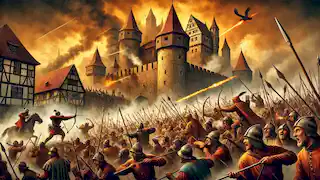Rothenburg ob der Tauber, a gem nestled in the Franconian hills of Bavaria, Germany, boasts a history as rich as its architecture is picturesque. Known for its medieval walls, timber-framed houses, and winding cobblestone streets, Rothenburg is a place where every corner holds a story. But there is one tale, whispered through the centuries, that eclipses all others—a tale of ambition, courage, and the perils of meddling with powers beyond understanding.
Our story begins in the year 1525, a tumultuous era marked by the Peasants' War, where waves of rebellion surged through the Holy Roman Empire. Rothenburg, a free imperial city, stood as a beacon of wealth and autonomy. Within its formidable walls lived merchants, artisans, and noble families, each playing their part in the city's enduring legacy. Among them was a family whose fate would intertwine with Rothenburg’s in unimaginable ways. The city of Rothenburg was alive with the hum of daily life. The Marktplatz was the heart of the city, bustling with merchants selling everything from silks to spices. Towering over the square stood the Rathaus, its clock chiming a reminder of Rothenburg's prominence as a free city. On its cobblestone streets walked Adelheid, a spirited 17-year-old with auburn curls peeking out from beneath her bonnet. Her sharp mind and insatiable curiosity set her apart in a city that often valued conformity over innovation. Adelheid’s father, Heinrich, was a merchant who had climbed the social ladder through relentless ambition. His thriving trade in luxury goods had elevated his family to prominence, but Heinrich wanted more. He dreamed of earning a title, a position on the city council, and securing his family’s legacy. One evening, as the setting sun bathed Rothenburg in golden light, Heinrich received an urgent summons from Mayor Georg Nusch. A tall, imposing man with a reputation for prudence, Nusch governed Rothenburg with a firm hand. Heinrich arrived at the council chambers, the walls lined with tapestries depicting Rothenburg's victories. The meeting was tense. Nusch warned of a growing peasant rebellion in the surrounding countryside. “Our walls have stood for centuries,” Nusch said, his eyes narrowing. “But desperation makes people fearless.” Heinrich seized the opportunity to propose an ambitious trade route that would bring wealth to Rothenburg while strengthening its defenses. “Prosperity will unite us,” Heinrich argued. But Nusch was wary. “Wealth attracts as much danger as it brings fortune,” he said, leaving the council chamber with an air of finality. That night, a storm roared over Rothenburg. Thunder cracked like cannon fire, and rain lashed against the city walls. As the city’s gates creaked in the wind, a lone rider approached. Cloaked in black, with only the faint glimmer of a silver chalice visible in his satchel, the stranger dismounted. The gatekeeper, Hans, a grizzled war veteran, was immediately suspicious. “Who comes to Rothenburg in such weather?” Hans demanded, his torch illuminating the rider’s face—a gaunt visage with piercing eyes. “I am Ulrich, a herald of Emperor Charles V,” the stranger replied, holding up a scroll bearing the imperial seal. Hans scrutinized the seal before reluctantly allowing Ulrich entry. Ulrich sought an audience with the council, claiming his mission was of utmost importance. But it wasn’t just his words that stirred intrigue—it was the artifact he carried. The silver chalice was no ordinary vessel. Engraved with ancient runes, it shimmered as if holding its own light. Whispers of its origins began to spread before dawn. The council convened the next morning in the Rathaus. Ulrich stood before the council members, his presence commanding attention. “The empire faces turmoil,” he began. “Rebellions rise in the north, and Rothenburg will soon find itself in their path. The emperor offers his protection.” The proposal was clear: Rothenburg would pledge allegiance to Emperor Charles V, contribute troops to the imperial army, and in return, the city would be fortified against the coming storm. Ulrich placed the chalice on the table. “This artifact is a gift,” he said. “Its power could tip the scales of any battle.” The council was divided. Some saw this as an opportunity to solidify Rothenburg’s influence, while others feared losing the city’s independence. Mayor Nusch remained skeptical, but Heinrich saw a chance to elevate his family’s status. Despite Nusch’s warnings, Heinrich supported the proposal. Adelheid, however, was uneasy. Something about Ulrich and the chalice filled her with dread. That evening, she sought out Frau Hildegard, a reclusive herbalist and storyteller. “This chalice,” Hildegard whispered after examining it, “is no gift. It’s a relic of the ancient sorcerer Magnus, cursed to bring ruin to those who misuse it.” As word of the chalice spread, strange events began to plague Rothenburg. Fires in the hearths flickered and died without cause. Animals grew restless, their eyes reflecting a strange light. Townsfolk spoke of hearing whispers in the wind, and even the most rational citizens began to feel a growing unease. Adelheid, determined to uncover the truth, delved into Rothenburg’s archives. There, she found accounts of Magnus, the sorcerer who had lived centuries earlier in the Tauber Valley. Magnus was said to have crafted the chalice to summon otherworldly power, but its use came at a terrible cost. “The chalice grants victory,” one passage read, “but demands the soul of its wielder.” Heinrich dismissed his daughter’s warnings as superstition. “The council will see this as an opportunity, not a threat,” he said, clutching the chalice as though it were the key to his dreams. The rebellion came faster than expected. A peasant army, armed with crude weapons but driven by desperation, marched on Rothenburg. They camped in the Tauber Valley, their torches illuminating the night. The city prepared for battle. Archers lined the walls, and the streets echoed with the clang of smiths forging weapons. As tensions mounted, Ulrich urged the council to use the chalice. “Your city will fall without it,” he warned. Despite Nusch’s misgivings, Heinrich’s influence swayed the council. The chalice was placed in Rothenburg’s arsenal. The siege began with a fury. Arrows rained from the city walls, and boiling oil poured down upon the attackers. But the peasants were relentless, driven by a hunger for justice and freedom. Rothenburg’s defenders began to falter. In the darkest hour, Heinrich took matters into his own hands. Ignoring Mayor Nusch’s objections, he performed the ritual Ulrich had described. Chanting the incantation inscribed on the chalice, Heinrich poured wine into its basin. A blinding light erupted, and a spectral army rose from the ground—knights clad in shimmering armor, their swords blazing with ethereal fire. The spectral warriors charged the peasant army, cutting through their ranks like a scythe through wheat. Panic spread among the attackers, and within hours, the rebellion was crushed. But the victory came at a terrible cost. As the last of the spectral army faded, Heinrich collapsed. The chalice, now dark and cracked, fell from his hands. He had paid the price foretold in the legend. The siege was over, but Rothenburg was forever changed. Mayor Nusch declared the chalice a cursed relic and ordered it buried in the depths of the Rathaus, never to be used again. Ulrich disappeared as mysteriously as he had arrived, leaving behind more questions than answers. Adelheid, grieving her father’s sacrifice, resolved to honor his memory. She worked tirelessly to rebuild Rothenburg, ensuring that her family’s legacy would not be one of ambition but of service to the city. Years passed, and Rothenburg thrived once more. The tale of the chalice became a legend, passed down through generations as a cautionary tale of hubris and the perils of tampering with forces beyond comprehension. {{{_04}}} Today, Rothenburg stands as a symbol of resilience, its walls a testament to the strength of its people. And though the chalice is gone, its story endures—a reminder that even in the darkest times, the spirit of Rothenburg shines bright.Whispers of Prosperity and Shadows

The Storm and the Stranger
A Bargain with the Crown
The Curse Unfolds

Siege at the Gates
The Chalice’s Power

Aftermath and Legacy


















